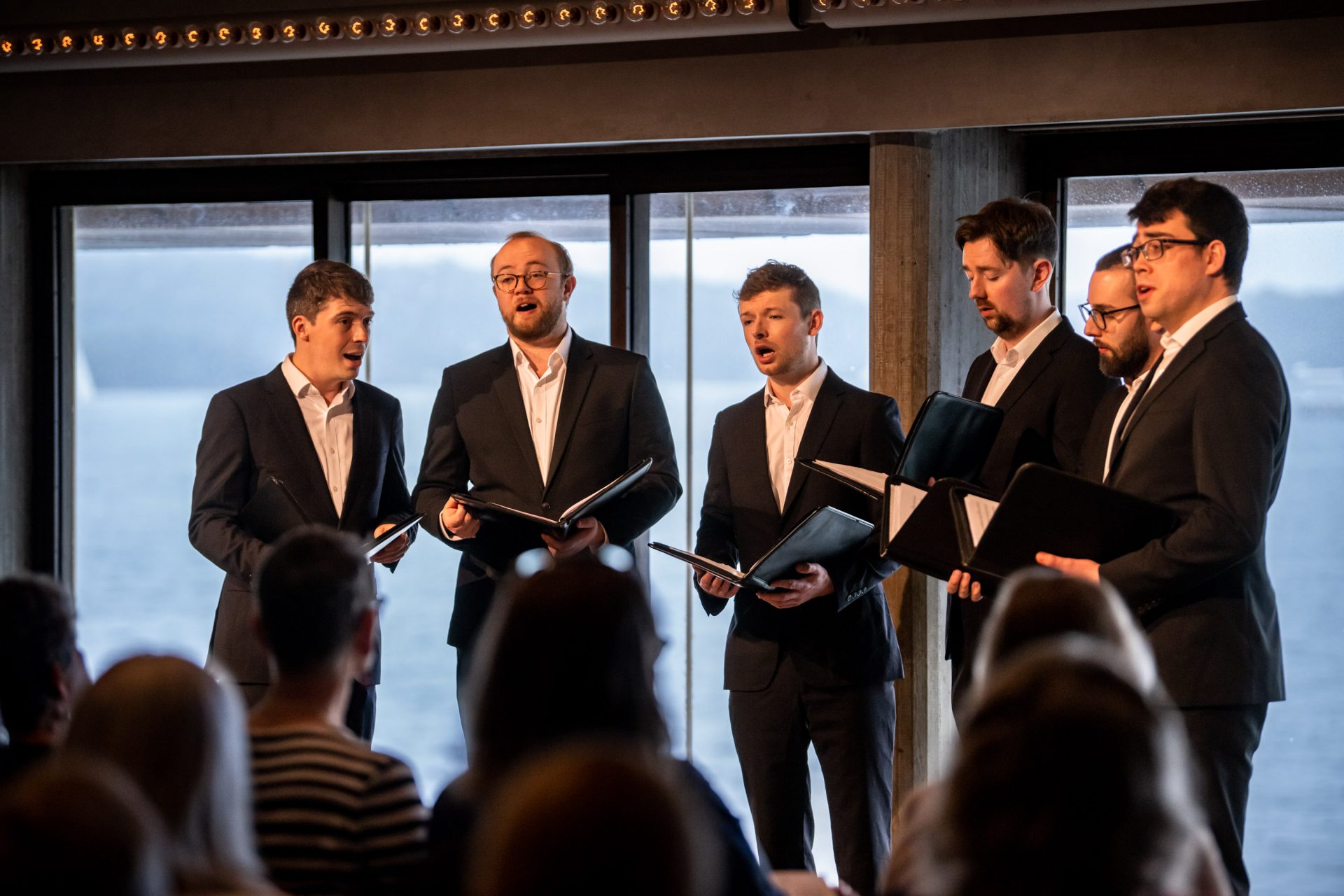It was a singular privilege for a Sydney audience to be treated to a performance by the widely acclaimed British vocal consort, The Gesualdo Six.
Touring in the Antipodes, they brought the sacred music of the English Renaissance to life with skill and feeling. The prominence given to Byrd in this concert was a fitting tribute to that great composer in his 400th anniversary year.
The group of six made great use of the space in the Utzon Room by beginning, with Tallis’s Te lucis ant terminum, from the back left of the room, behind the audience. Performed by only four member of the group, this was a fitting homage to the way the piece was originally performed, from the antechapel. This is precisely the use of space upon which Monteverdi, for example, capitalised to give dramatic effect to the secular as well as the divine.
The opening phrase of Byrd’s Ave verum corpus is sealed off with a typically Renaissance cadence. It then has a delightful contrapuntal treatment on ‘miserere’ distributed among each singer. The enunciation in bass of the falling phrase, with its jarring flat note, was a moment to behold.
Morley’s Nolo mortem peccatoris is similarly replete with the heaviness of Renaissance polyphony, but is not burdened by it. It is marked by a kind of wistful lightness. The text is partly in Latin and partly in English for Morley, as we know from some of his bawdier secular pieces, had a taste for the popular.
Sheryngham’s Ah, gentle Jesu was also in English, and was fitting for a concert so close to the Easter season. It consisted of something of a call and response structure between groups of two. So fulsome is the voice of each member of the consort that one is left with the impression that the piece is being sung by a choir. There were also delightful melismas for key phrases, like ‘confession’. Special mention should be made of Guy James’ remarkable performance, especially with the higher notes. His voice has an almost sonic accuracy.
The consort’s ability to tease out the tonal colours of each piece so movingly was on full display in Byrd’s Tristitia et anxietas. The composition was obviously a profoundly personal one for Byrd, perhaps a reflection on his struggles with his faith. Yet again it features a contrapuntal treatment on key thematic phrases like ‘in dolorem’ that was at once jarring and cathartic.
One of the main highlights, however, was Byrd’s Vigilate. It is, unusually, both lively and foreboding, formed as it is in the style of an Italian madrigal. It depicts both command and promise (and the theme upon which it is based is not unlike, for example, Bach’s ‘Bestelle dein Haus’ in his Actus Tragicus). The similarities with the madrigal can be seen in the way each phrase is treated so distinctly, like with the rambling melisma to depict the call of a hen.
White’s Christe qui lux es et dias began with a clear and forceful introitus by Michael Craddock, and the consort moved, bit by bit, around the Utzon Room.
But by far the highlight of the afternoon was the performance of Tomkins’ When David heard. There are, of course, other settings of this parable. But Tomkins’ stands out. It is as though the piece were composed with this consort in mind. The consort negotiated well the vast emotional fluctuations in the piece, and the gradual build-up of all voices into a dramatic climax. The repeated line ‘Absalom my son’, conveyed fully the desperation latent in the text. To give this effect in the Utzom Room, far removed from the cathedrals with ethereal acoustics for which these pieces were composed, is no mean feat. But that is a challenge fit for this consort.
The afternoon was rounded off by a thrilling rendition of Byrd’s Laudate pueri dominum. A setting of the same text, this time by Buxtehude, was performed only hours later by Pinchgut Opera. This was truly a world-class performance.
